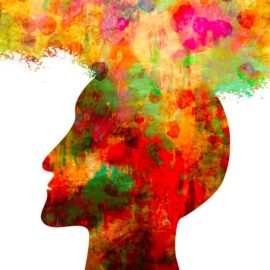
What are the best The Wisdom of Insecurity quotes about overcoming anxiety? What are ways people distract themselves from pain and insecurity?
In The Wisdom of Insecurity, Alan Watts discusses the best and worst ways to cope with insecurity. He also explains why he prefers Eastern religious concepts like unity and mindfulness over Christianity, science, and consumerism.
Check out these The Wisdom of Insecurity quotes to get Watts’s main ideas.
The Wisdom of Insecurity Quotes
The Wisdom of Insecurity is philosopher Alan Watts’s 1951 treatise on the origins of and solutions to modern anxieties. According to Watts, we feel anxious because the only constant in life is insecurity—which means that seeking security is futile. He says that based on Eastern philosophies, we should embrace a more realistic approach to life—one where we accept insecurity and live in the moment instead of worrying about the future.
These The Wisdom of Insecurity quotes give great insight into the philosophy and psychology of anxiety, in addition to how faith plays a role in mental health.
“What we have forgotten is that thoughts and words are conventions, and that it is fatal to take conventions too seriously. A convention is a social convenience, as, for example, money … but it is absurd to take money too seriously, to confuse it with real wealth … In somewhat the same way, thoughts, ideas and words are “coins” for real things.”
Watts notes that despite the utility of pain and death, your anxiety about these experiences leads you to pursue an endless stream of pleasure. You know your time on earth is limited and that pleasures aren’t promised, so you want to cram as much pleasure into your life as possible. You probably engage in consumerism—the purchasing of goods and services beyond the bare necessities—to make that happen. Consumerism is a vicious cycle: Experiencing one pleasure makes you desire more and better pleasures (for example, you might always be chasing the high of obtaining the newest, fastest car). As a result, consumerism can never satisfy you. Watts says this means that the more you pursue pleasure, the more anxious you become.
As a consumer, you fixate on the future. When you’re experiencing pain, you try to make yourself happy by diverting your attention from your discomfort to ways you can maximize pleasure in the future. However, Watts says that you’ll never experience the future—you can only ever experience what’s happening in this present moment; in the next moment, you’ll experience what’s happening in that present moment. This means that pursuing a future goal is futile. Also, distracting yourself from the present diminishes your ability to fully experience the present. You won’t fully enjoy any pleasurable experience, so you’ll keep seeking out future pleasures, and you won’t be able to deal with and move on from pain. This extends your anxiety.
Therefore, Watts argues that contrary to popular belief, the inevitability of pain and death isn’t what makes life difficult—what makes life difficult is your insistence on pursuing future pleasures and sparing yourself from future pain and death.
“If we cling to belief in God, we cannot likewise have faith, since faith is not clinging but letting go.”
According to Watts, a way people cope with insecurity is by seeking comfort in religion or science. In this section, we’ll discuss why Watts believes Western perspectives (Christianity and science) on insecurity are inadequate, and we’ll explore the Eastern approach he says is more valuable.
Watts explains that the thinking self attempts to impose order and stability on life by naming and classifying your experiences. For example, labeling an animal you see with the word “dog” helps you predict how that animal will behave. Naming and classifying seems to make life more predictable. Watts says that for much of Western history, people seeking predictability have adopted Christianity, which promises eternal life, an unchanging God, and permanent values. Then, Westerners turned to science, which offered security in the form of immutable, universal laws and the potential of happiness on earth instead of in the afterlife (for example, by reducing suffering with the help of modern medicine).
However, Watts says that around the time he was writing this book (the 1950s), Westerners had found both Christianity and science unsatisfying for the reasons listed above: Focusing on the future is futile and dilutes your experience of the present. This made people feel like life had no meaning, and they turned to consumerism (also futile) for comfort.
“To put it still more plainly: the desire for security and the feeling of insecurity are the same thing. To hold your breath is to lose your breath. A society based on the quest for security is nothing but a breath-retention contest in which everyone is as taut as a drum and as purple as a beet.”
Watts explains that every human has an animal self and a thinking self. Despite the fundamental insecurity of life, many people continue to hope or strive for security because they identify with their thinking selves over their animal selves. Your animal self has two key qualities: It has sophisticated instincts (for example, hunger cues), and it lives in the moment, always in flux—transitioning from hungry to satiated, for example, or from sleepy to alert, depending on the internal and external sensations it perceives. Your animal self doesn’t think, and it’s never concerned with the past or the future; it simply exists in the here and now and acts according to its internal wisdom rather than any abstract rules.
On the other hand, your thinking self is conscious—it’s able to contemplate, remember, and imagine. It also has time consciousness (a sense of continuity between the past, present, and future). Time consciousness makes you believe that you’re a stable, independent entity—since you share memories with your 10-year-old self, you believe you’re the same person you’ve always been. Your thinking self wants to continue being a stable, independent entity—so it resists change and tries to achieve permanence, even though it can’t.
Since your thinking self wants to become permanent, you become anxious about things that threaten your permanence—namely, painful experiences and death. But Watts explains that pain and death are both necessary and valuable parts of life. He says that pain must accompany pleasure because if you experienced a constant stream of pleasure, you’d eventually become numb to it—or it would hurt you, the way too much alcohol can turn you into an addict. Pain punctuates your experience to make pleasure meaningful and enjoyable. Watts argues similarly that death is a good thing—you’d get tired of living if you lived forever.
“Human desire tends to be insatiable.”
Integrating your animal and thinking selves transforms pain. Watts says when your thinking self is in charge, you try to escape pain by distracting yourself from the experience with thoughts of the past or future. But this is futile because you can’t escape the present—recall that you are your present experience. Distracting yourself from the present only disrupts your ability to understand and accept it, which is necessary if you’re going to move through it. Therefore, distracting yourself from pain only prolongs pain. When you embrace your animal self, you deal with pain like animals do: You’re able to endure the pain as it’s happening, and when it’s over, you move on. Your thinking self focuses on your present experience instead of avoiding it.
Embracing your animal self also helps you more fully enjoy pleasure and avoid causing yourself unnecessary pain. This is because, as discussed, focusing your awareness on the present (instead of the past or future) allows you to get the most out of each moment—for example, you’re going to enjoy the act of gardening more if you’re focused on the sensation of working with plants and dirt than if you’re focused on whether your flowers will bloom in the future.
Watts says that embracing your animal self also prevents you from getting trapped in the painful, anxiety-producing cycle of consumerism.
According to Watts, integrating your thinking and animal selves also gives you a deep, bodily understanding—rather than an abstract idea—that everything that exists is part of an integrated whole. This will enable you to experience true freedom.
Watts argues that when you understand yourself as an individual thinking self, you tend to conceive of freedom as your ability to influence the world. But when you see yourself as part of the whole, you understand freedom as the ability to be part of existence—you can do anything that’s possible because you’re already part of the world of possibilities, and you’ll listen to your bodily cues instead of being restricted by human abstractions like schedules and religion.
Watts says once you have a bodily understanding of essential unity, you’ll stop making decisions based on the unnatural pursuit of pleasure or the avoidance of pain—you’ll simply be going with the flow from moment to moment. In his view, most immoral actions are the result of pursuing pleasure and avoiding pain—prioritizing the thinking self’s desire for permanence over your true momentary needs. Moral actions, on the other hand, are the result of being united with all of existence—which Watts argues is the equivalent of love, since love brings things together. He explains that the combination of living in the present and acting in a loving way is key to a more peaceful, united world.






